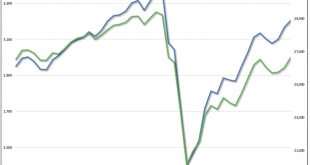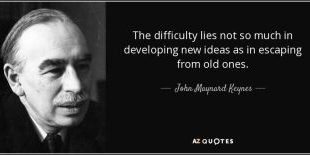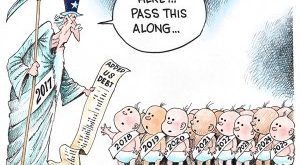from Dean Baker The push for a $15 an hour minimum wage has developed considerable political momentum over the last decade. It is a very real possibility that we will see legislation imposing a national minimum wage of $15 an hour by 2024 if Joe Biden wins the election this fall. That would be a great thing, it would mean a large increase in pay for tens of millions of workers, but it is still very modest compared to what the minimum wage would be if it had kept pace with productivity...
Read More »Ontology, framing, and all that jazz
from Peter Radford The collection of papers edited by Uskali Mäki and published in 2001 under the title: “The Economic World View, Studies in the Ontology of Economics” seems to be quite pertinent given the reaction to my recent comments on complexity. It is a wonderfully rich source of thought about what, exactly, economics is, which is something that seems to confound a great number of people. Quite often I get the sense that some critics are upset with economics because it isn’t...
Read More »Divergent recoveries—pandemic edition
from David Ruccio The existing alphabet soup of possible recoveries—V, U, W, and so on (which I discussed back in April)—is clearly inadequate to describe what has been taking place in the United States in recent months. That’s because there’s no single path of recovery for everyone. For some, the recovery from the pandemic crisis has been just fine, while for many others there has been no recovery at all. Instead, things are going from bad to worse. In other words, there’s a growing gap...
Read More »Heterodox economics needs to develop an agreed ontology and agreed modeling methods
from Ikonoclast The essential problem is that heterodox economics needs to develop an agreed ontology and agreed modeling methods, including broad agreements on the likely limits to modeling. Peter Radford has pointed out some of the ways (and reasons why) the economy cannot be modeled accurately in key respects. Orthodox economics has an agreed framework. Orthodox economists mostly agree on their framework and they accept their implied economic ontology, without question or discussion...
Read More »Keynesian vs Newtonian economics
from Lars Syll To complete his theory, Keynes tied these elements together. The market for money determined interest. Interest (and the state of business confidence) determined investment. Investment, alongside consumption, determined effective demand for output. Demand for output determined output and employment. Consumption out of incomes determined savings. Employment determined the real wage. In this world, a change in monetary policy, such as a cut in interest rates leading to an...
Read More »Why isn’t Modern Monetary Theory common knowledge?
from Blair Fix I’ve always been baffled why ‘modern monetary theory’ is called a theory. I don’t mean this in a disparaging way. As far as theories of money go, I think modern monetary theory (MMT for short) is the correct one. But having a correct theory of money is a bit like having a correct theory of traffic lights. Traffic lights (like money) are a social convention. We agree that red means stop and green means go. Why we’ve chosen these particular colors is an interesting question,...
Read More »Rethinking public debt
from Lars Syll Public debt is normally nothing to fear, especially if it is financed within the country itself (but even foreign loans can be beneficent for the economy if invested in the right way). Some members of society hold bonds and earn interest on them, while others pay taxes that ultimately pay the interest on the debt. The debt is not a net burden for society as a whole since the debt ‘cancels’ itself out between the two groups. If the state issues bonds at a low-interest rate,...
Read More »The stock market and MMT: the Dow Is not your friend
from Dean Baker It is standard for economic reporters to treat higher stock prices as good news. A rising stock market is often touted in the same way that job gains or GDP growth are touted, as evidence of a stronger economy. This can be true. When the economy is growing at a healthy pace, the stock market is usually rising also. But the link is far more tenuous than is generally recognized. The market is in principle a measure of expected future profits. Policies that redistribute...
Read More »More Complexity
from Peter Radford Economists have been talking about complexity for a very long time. This may surprise many of you given the state of mainstream economics, but it is true. A good place to discover a preliminary history of complexity in economics would be the short volume edited by David Colander published in 2000. The papers it contains were all presented at a History of Economics Society Conference in 1998. Colander provides a good introduction and tries to put complexity into the...
Read More »Paul Krugman — a case of dangerous neglect of methodological reflection
from Lars Syll Alex Rosenberg — chair of the philosophy department at Duke University, renowned economic methodologist and author of Economics — Mathematical Politics or Science of Diminishing Returns? — had an interesting article on What’s Wrong with Paul Krugman’s Philosophy of Economics in 3:AM Magazine a couple of years ago. Writes Rosenberg: When he accepts maximizing and equilibrium as the (only?) way useful economics is done Krugman makes a concession so great it threatens to...
Read More » Real-World Economics Review
Real-World Economics Review




